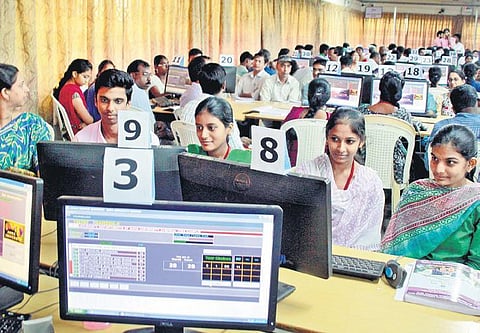

CHENNAI: The construction and manufacturing sectors are growing fast in India, but there are only a few takers for civil and mechanical engineering courses. Employment has increased by 29 per cent in nine sectors — including IT, manufacturing, and construction — as per the first-quarter report of the Quarterly Employment Survey (April to June 2021). However, the demand for civil and mechanical engineering courses has been reducing each year, say academicians, adding that this is a worrying trend.
In 2016, out of 28,500 civil engineering seats in colleges across Tamil Nadu, only 10,088 were filled; of the 42,406 mechanical engineering seats, just 21,137 were filled. In 2017, out of 25,257 civil engineering seats, only 8,199 were filled, while in the mechanical stream, just 19,601 out of 38,353 seats were filled.
In 2020, colleges struggled to fill their civil engineering seats, as only 3,974 students joined, while 16,944 seats were available. In the mechanical stream, 29,354 seats were available but only 8,179 students joined, said career consultant Jayaprakash Gandhi, who has been closely following engineering counselling in the State for over a decade.
“This year, the scenario will be no better for these traditional engineering courses as the craze for computer science and IT courses continues. IT companies hire in bulk and their salary structure is definitely better than that of core manufacturing companies,” said Gandhi.
Experts cite various reasons for the declining popularity of civil and mechanical engineering courses. While some say low salaries and lack of adequate job opportunities in these sectors are a deterrent, some others assert that the syllabi are outdated, and hence, graduates lack the skills required by the industry.
“Civil and mechanical engineering graduates are not trained properly in college. There is no dearth of jobs in these sectors. But the reality is that instead of hiring mediocre engineering graduates, companies prefer to recruit diploma engineers, who have more field knowledge, and take lower salaries,” said former vice-chan-cellor of Anna University E Balagurusamy.
“There is an urgent need to revamp the syllabi for civil and mechanical engineering courses in the State to make our students more employable and relevant for the industry. When these sectors are moving swiftly towards automation, we also need to train our students in computing and coding,” said Gandhi.
Industry experts, meanwhile, feel students these days prefer white-collar jobs that let them work from comfortable air-conditioned offices. “In the construction sector, a civil engineer is supposed to be on the site and has to toil under the scorching sun to supervise operations, which many youngsters don’t want,” said L Shanthakumar, chairman of the Builders’ Association of India (southern centre).